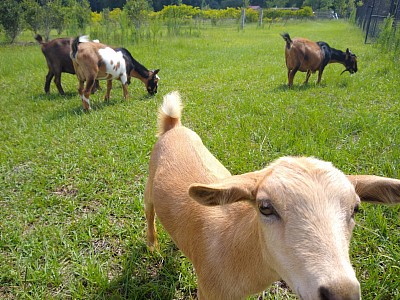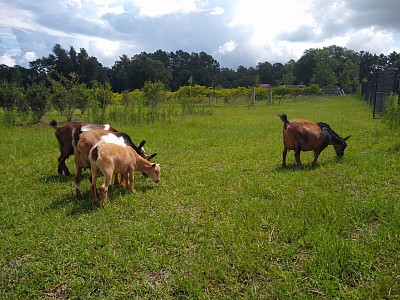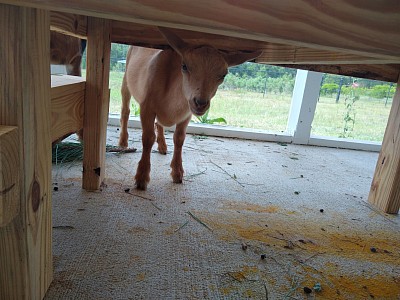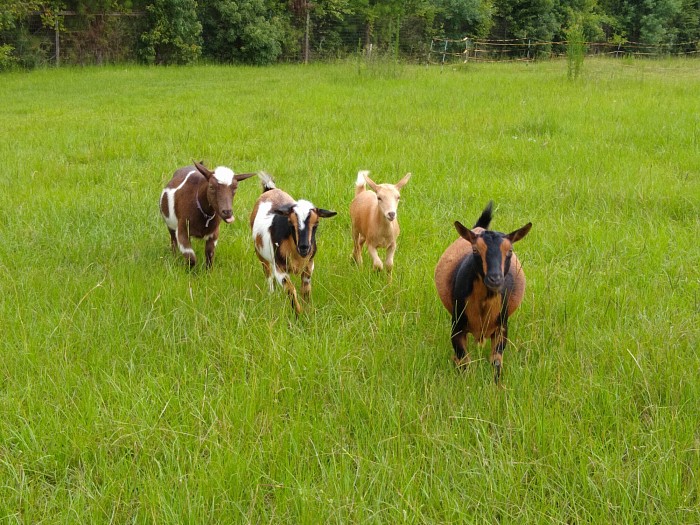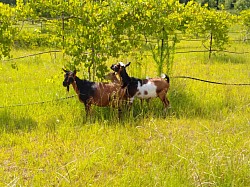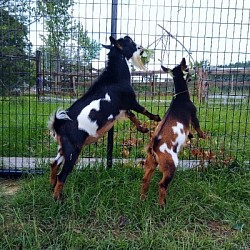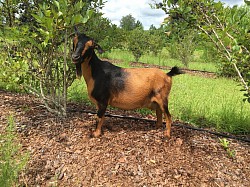High Performance Nigerian Dwarf Dairy Goats in North Florida
Welcome
Welcome to Athelas Hill, where we raise Nigerian Dwarf goats naturally, in harmony with nature & God. We have raised other livestock conventionally and have also experienced both conventional and natural approaches with horses and ourselves. Natural simply works better. Better for the animal. Better for the environment. And better for the humans. When conventional medicine failed me and my pony, natural medicine saved our lives. The foundation of health is nutrition, and the goats are an important part of the foods we produce here.
I knew that I needed raw milk, after experiencing its benefits before we moved here. I knew that I didn’t want a cow, since that is just too much animal. I decided on Nigerian Dwarf goats since it sounded like they make the best tasting milk. Plus they are smaller and easier to handle than other breeds, which is a huge plus when you’ve acquired as many injuries as we both have. They are also perhaps the most engaging, pleasant livestock breed we’ve both ever worked with.
Raising them naturally means avoiding GMO feeds, custom mixing feed, avoiding synthetic nutrients, focusing on nutrient balance, using herbal dewormer and focusing on management. It is absolutely critical to not underestimate the role stress plays with health, and its our job to make sure they are as happy and relaxed as possible.
Our Breeding Program
- Structurally sound & conformationally correct
- Robust immune system
- Friendly & human oriented
- Strong milk genetics
2024 Kidding Schedule
Sales Policy
Our kids are all dam raised. They live with their moms and are handled daily. Living with the herd teaches them how to be goats. Daily handling gets them well acclimated to humans. We highly suggest that you spend time with your new kid, so they can get used to you and you can get to know them. Raisins are a favorite treat and there isn’t much they won’t do for a raisin. :D
There's a popular misconception that the only way for kids to be friendly is to bottle feed them. In reality, it comes down to how much handling they get. All our kids are handled a minimum of 2 times a day from birth. I make sure to spend time just hanging out with them during at least their first month. Kids are very curious and inquisitive. They love new things, especially a human sitting on the ground with them!
I use their natural curiosity to initiate several games. One invites the kid to come snuggle on my lap, so they learn that being touched everywhere is enjoyable. Once they love snuggling, I move on to touching them all over. The entire spirit of this game is fun, never ever force or fear. Letting me touch their legs and lift them. Getting doelings used to having their udders handled and getting bucklings used to having their testicles handled. Just in case they grow up and their future home wants to show them. When they seem to understand that yielding is fun and safe, I move on to gently leading them a few steps. This is the start of teaching them to lead.
We do not accept reservations but we maintain a wait list. Please feel free to contact us if you are interested in a particular breeding or have any questions. Kids will stay with their dams until they are 8 weeks old. While they can be weaned at this time, the transition to a new farm can be very stressful. They can benefit from getting 1 bottle a day through 12 weeks, though some individuals or circumstances may need more. Part of natural goat care is observing and listening to what the goat is “saying” with their behavior. Never, ever underestimate the detriment of stress and minimize it as much as possible. For example, during that extreme 100F+ heat wave we wound up giving our 12+ week old buckling 2 bottles a day just to help him cope with the heat. Just one example of one possible instance where a 12+ week old would benefit from still being bottle fed.
All goats are raised naturally, with organic and/or non-gmo feeds, daily herbal deworming and no vaccinations. I’ve seen too many problems from feeding conventional feed and vaccinating in my 30+ years of experience with different livestock and pets. Resistance to chemical dewormers is becoming more of a problem, though this is not a problem with herbs. I have also seen baycox, a new dewormer for coccidia, do nothing to reduce coccidia count in a kid while also causing that kid to develop diarrhea. By contrast, the herbal dewormer pair I make reduced the egg counts without causing any diarrhea. Plus there is no withdraw time for herbs like there is with chemical deworming, a huge plus for milk goats!
Disbudding is an uncomfortable but necessary herd health task. The procedure itself is not enjoyable for the goat, however the brief discomfort is far better than the pain from being gored by a horn. Plus goats love getting into trouble, and a disbudded goat can’t get it’s horns tangled in anything!
Our prices are based on production, conformation, and genetic potential for milk production. There are no guarantees with breeding ever, but having many generations of high producers increases the odds of the kids being more of the same. Prices may change in the future as we generate more production data.
I do not have the hand strength necessary to castrate or tattoo a kid. Wethers will be sold “as is” with no papers and it will be up to you to castrate them. Each kid will be provided with the correct tattoo letters and numbers on their registration certificate. It will be up to you to tattoo them with the letters & numbers that match their registration certificate, if you so choose to.
All kids will be registered with AGS. They are eligible to be registered with ADGA if you wish and we would be happy to provide the application. I'm happy to talk more about why I'm doing things this way.
A non-refundable deposit of 50% of the purchase price is necessary for us to hold the kid until weaning/pick up. Buyer is responsible for all veterinary costs and health papers and all costs associated with transport. We require transport within an enclosed vehicle, for the health and safety of the goat. It gets rather hot in Florida plus having bedding an road dust blowing into a crate in the back of a pickup truck isn’t healthy for the goat. Especially since goats can be prone to lung issues. Likewise, transport with a commercial transporter can be fraught with health hazards, from blowing bedding/dust to contagious diseases from other animals or the stress of transport. Due to their size, a Nigerian will fit rather easily in a dog crate for air travel. We are happy to work with you to arrange air shipping.
In the event of unforseen illness or accident we will refund your deposit as soon as can or you may choose another kid if one is available. Likewise, if we are uncomfortable with a sale or transport situation, we reserve the right to act in the goat’s best interests, cancel the sale and refund the deposit in full. We reserve the right to keep any kid born here. In cases where the kid we decide to keep is one you had reserved, you can either choose another available kid or we will refund your deposit.
Life happens and sometimes plans change. Please let us know as soon as possible. If you have a deposit on a goat and said goat has not been picked up or had transport arranged for it within 90 days of sale or weaning and you have not communicated with us, all monies will be forfeit and the goat will be offered for sale again. If something happens or for whatever reason, please just let us know.
Herd management and bio security are critical components to having any livestock. We have as much control as any human has on the goats when they are here, but we have no control over things when they leave here. Each goat we sell is healthy to the best of our knowledge when it leave our farm. However, we cannot be responsible for it’s health when it leaves, so they are sold as is. Each goat will be provided with a week’s worth of the feed we use and herbal dewormer, plus written care instructions. It’s then up to you to care for the precious living creature. I am not a vet, so I would suggest you contact one if needed. I am happy to attempt to help in any way I can, but that is not a substitute for veterinary care.
Goat Care Practices
Contrary to the goatal mythunderstandings out there, goats are in fact fairy delicate creatures. :D One thing is certain there will be bad goat jokes.
Goats are browsers by nature, which means they have fairly high mineral requirements. The trees & weeds they are inclined to eat have more minerals than grasses do. They are selective about what they will eat. No, a goat will not eat anything. The bucks & does also vary in what they choose to eat. For example, the bucks prefer to eat different trees that the does. I'm assuming because there are differences in protein level & minerals.
All goats need access to clean drinking water, something that's easier said than done since some love to poop right in their water! Here the bucks get some apple cider vinegar added to their water to prevent urinary calculi. The does get plain water, except for during the heat of summer. Does need more hydration since they are producing milk too, so they get 1 bucket of plain water and 1 bucket of water with some blackstrap molasses added to it.
They are ruminants and need access to food 24/7. Here that is a combination of grass and hay. Sometimes I will harvest different trees for them to much on, which they seem to really enjoy. The does get Alfahay twice a day. As of Spring 2023, I'm now formulating and mixing my own goat feeds from organic and non-GMO components. One is a basic maintenance feed and the other is a higher protein and calorie lactation feed. We ran into a fairly major issue with the commercial organic feed we were using, so we had to make a change.
Minerals are very important as well. The bucks get an organic mineral mix free choice and kelp. The does get organic minerals, kelp, a food based mineral and natural salt free choice. Iodine from the kelp and the salt help them keep their milk production up, even during the heat of summer.
Parasites are a constant problem here in Florida, since it's just so warm and wet. I've developed a 2 part herbal parasite prevention protocol, which has been quite successful. Plus there's no milk withdraw time with herbs. Healthier goats, more milk. Win win! :D
Then there's the ugly side...there will be goat poop. Lot's of it. They let it fly with goatal abandon. So I get to clean that up each day. It is rather small, so sweeping it into a dust pan with a broom works best.

